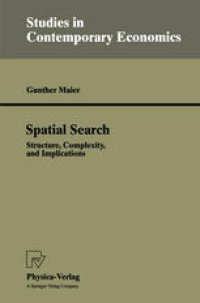
Ebook: Spatial Search: Structure, Complexity, and Implications
- Tags: Regional/Spatial Science
- Series: Studies in Contemporary Economics
- Year: 1995
- Publisher: Physica-Verlag Heidelberg
- Edition: 1
- Language: English
- pdf
Two areas have fascinated me for a long time. One is the micro economic theory of consumer behavior, the other one the role of space in economic processes. Usually, the two don't go together very well. In more advanced versions of microeconomic consumer theory its economic actor may face uncertainty, have to allocate resources over time, or have to take into ac count the characteristics of products, but rarely deals with space. He/she inhabits a spaceless point economy. Regional Science, on the other hand, describes and analyzes the spatial structure and development of the econ omy, but either ignores individual decision making altogether or treats it in a rather simplistic way. In this book I try to bring together these two areas of interest of mine. I do this by use of the microeconomic concept of search and placing it in an explicit spatial context. The result, in my opinion, is a theoretical concept with fascinating implications, a broad set of potential implications, and numerous interesting research questions. After reading this book, where I layout the basic idea of spatial search, describe its elements, and discuss some of its implications, I hope the reader will share this opinion. There are still plenty of unanswered research questions in this part of economic theory. Hopefully, this book will stimulate more work along these lines.
The book provides the first comprehensive discussion of optimal search theory in a spatial context. By treating the alternatives of a search problem as spatially distributed, the standard structure of an optimal search model is altered considerably. The book discusses the basic structure of this spatial search problem and demonstrates that it falls into a class of highly complex problems. After a brief discussion of potential simplifications and heuristic solutions it applies the microeconomic concept of spatial search to selected aspects of spatial economics like spatial price theory, the theory of market areas, and agglomeration theory. It can be demonstrated that a spatial search based theory can capture a number of well known phenomena, e.g. the transition from a dispersed to an agglomerated locational pattern.